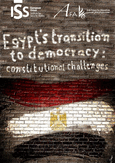You are here
Egypt's transition to democracy: constitutional challenges

This timely seminar took place on 25 March 2012 in Cairo and was jointly organised by the EUISS and the Arab Forum For Alternatives. The seminar aimed to compare the different constitutional processes of other nations that have experienced a democratic transition with the constitutional process underway in Egypt. The Brazilian, Indonesian, Portuguese and Spanish experiences of constitution making were highlighted as useful case studies for the Arab world to examine. When discussing ‘state, politics and religion’, the panel explored how Indonesia chose not to include Islam in the constitution following independence. In Egypt, this separation of religion and state was said to be more difficult as Sharia law is already part of the present constitution. It was noted how the debate surrounding the role of Islam in political life is set to continue as the constitutional process evolves. There was also a strong sense that the Tunisian experience in seeking consensus between secularists and Islamists was having an influence on the debate currently underway in Egypt. Referring to the experience of Brazil, it was said that the constitutional process sought to be inclusive and consensual and consulted the maximum possible amount of actors, in particular those from civil society. In Egypt, the challenge is now the need to achieve a consensus between the Muslim Brotherhood, the Salafists and liberals. It was also suggested that the way the Constitutional Committee was currently being nominated was undermining this vital political balance. The Spanish experience with constitution making was said to show the importance of seeking new ways to integrate society into the political process beyond traditional party politics. Political systems which have a semi-presidential nature were identified as being useful examples for Tunisia and Egypt to model themselves on. This is particularly so as current politics in Egypt is divided between those that favour a presidential system and those that favour a parliamentary system. The presidential tradition for many Liberals appears to be the best way to defend the values of the revolution whilst for the Muslim Brotherhood, the parliamentary system is viewed to be more appropriate, safeguarding democratic legitimacy rather than revolutionary legitimacy. In relation to civilian-military relations, the Portuguese experience shows that whenever the military takes power, even in the name of democratic revolution, the process of normalisation is prolonged and requires greater compromises. In Egypt, the difficulty in removing the military from power was said to be exacerbated by the important stake in the economy and the number of privileges that the army currently has and will attempt to maintain. It is clear that a compromise between democratic forces and the military in Egypt that will allow for a smooth transition of power to a civilian regime has yet to be achieved. The seminar concluded that the priorities for the constitutional process underway in Egypt can be summarised as follows:
- The need to achieve consensus between Islamists and secularists
- The need to avoid the consolidation of the power of the military